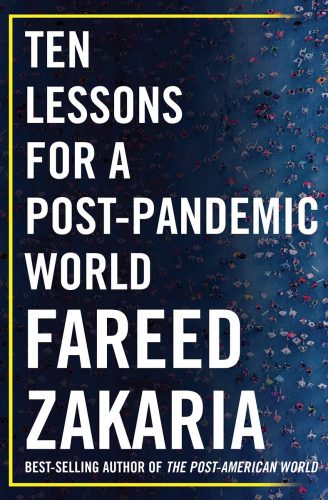By Fareed Zakaria
Perhaps the most original contribution of Fareed Zakaria’s new book “Ten Lessons for a Post-Pandemic World” is his “general theory” of COVID-19. Zakaria looks back 20 years to the political consequences of the 9/11 terrorist attacks, as well as those flowing from the 2008 global financial crisis, as dress rehearsals for the pandemic. Each share an asymmetrical element, as world-changing events propelled by something very small.
In the 2001 terrorist attacks, Zakaria points to the box cutters carried by 19 hijackers aboard four planes and the thousands subsequently killed – which then led to the US invasion of Afghanistan and Iraq, the “global war on terror”, the upheaval of security systems worldwide, and consumed the life of the Bush administration and its dealings with Middle East regimes.
 In the financial crisis, Zakaria finds the root cause in investment bank J.P Morgan’s invention of credit default swaps, a little-known derivative product, which became so large and risky that it convulsed the global economy. The political impact fuelled the rise of populism and arguably the election of Donald Trump.
In the financial crisis, Zakaria finds the root cause in investment bank J.P Morgan’s invention of credit default swaps, a little-known derivative product, which became so large and risky that it convulsed the global economy. The political impact fuelled the rise of populism and arguably the election of Donald Trump.
Then we have a viral speck somewhere in China, which directly or indirectly infected human beings, and gave us COVID-19 – a world-changing virus so tiny, its entire collective mass could fit inside a soft-drink can.
Zakaria links an underlying dynamic between 9/11, the global financial crisis and COVID-19 in the extraordinarily fast pace of modern life, which he argues is unstable and will continue generating backlashes. He blames infections such as COVID-19 on the modern drive to destroy forests and wild habitats, on crowding and factory farming – a lifestyle he likens to speeding in a car without a seatbelt or insurance. And worse could follow, whether a more lethal or infectious virus, or a consequence from climate change.
In short, Zakaria sees the COVID pandemic as a symptom of larger forces. COVID-19 has revealed weaknesses in governance and in some cases accelerated underlying trends. But in urging a more sustainable path, Zakaria quotes Larry Brilliant, the American doctor who played a role in the eradication of smallpox, that “outbreaks are inevitable, but pandemics are optional”. In other words, even in the face of larger forces, human beings have agency.
Whether governments can learn the lessons is another question. Past experience with the SARS and MERS crises appeared to help during the first months of the pandemic in places such as Taiwan, South Korea, Hong Kong, Singapore, even if the virus has proved challenging since. But Zakaria is not as confident that countries such as the US, the UK, and Brazil can learn, suffering from the smugness of past strength. Zakaria’s treatment of India is more cursory, the book having been published before the horrors of India’s pandemic took hold, yet it may be that the same lessons apply.
A better future will also require more effective international cooperation, something lacking through the COVID-19 pandemic. Zakaria argues for a much stronger World Health Organisation. The weak mandate of the WHO results as much from an unwillingness on the part of the United States to allow international scrutiny of its system as it does from an overbearing influence from China. This delves into the arena of great-power rivalry, and the threat of unravelling the world order unless the US forgoes its attitude of exceptionalism while allowing China the chance to also shape the rules-based order.
Zakaria despairs of today’s leaders who have lived through peace and prosperity yet turned inward with narrow, selfish and parochial worldviews, unlike idealists of the past who met challenges by laying the foundations for prosperity, peace and poverty reduction.
The book is vast in its scope, about the inequality between rich and poorer nations, as well as within, and the challenge of trust in governments and institutions. At times the text leaves a feeling that a COVID-19 narrative has been stitched into a book written before the pandemic – yet the conclusions are laudable all the same.
Some readers will find reason to quibble with Zakaria’s approach. But the book stands as a profound analysis of future challenges, even though the post-pandemic world is yet to arrive.






